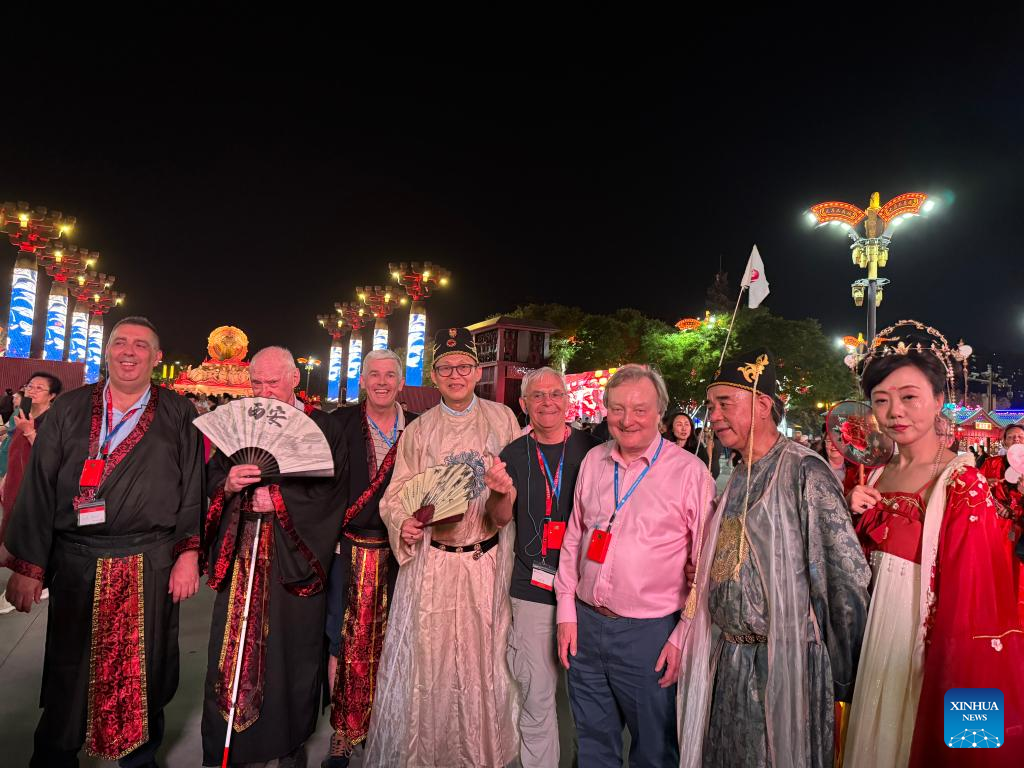
International tourists dressed in antique style Chinese attire pose for photos with Chinese tourists at the Grand Tang Mall, a bustling pedestrian area, in Xi'an, northwest China's Shaanxi Province, May 14, 2024.(Xinhua/Wang Jialin)
XI'AN, May 23 (Xinhua) -- On a recent visit to the city of Xi'an in northwest China, 75-year-old Australian tourist Andrew Baxter found himself stepping back in time to the Tang Dynasty (618-907), exploring the breathtaking beauty of Chang'an, the ancient capital of the Chinese empire, that once amazed ancient people over a millennium ago.
Together with others in his international tour group, he enjoyed an immersive cultural experience, strolling through the antiquated Tang-style pavilions of the bustling Grand Tang Mall, dressed in traditional Chinese attire.
Fresh from this timeslip-style journey, Baxter expressed his delight at the opportunity to explore this Tang Dynasty-themed pedestrian area, a key tourist attraction in Xi'an. "It feels brilliant that we can do what local tourists do," he said.
For tourism industry insiders, Baxter and his tour group exemplify a significant shift among international travelers in China toward more personalized and immersive travel experiences involving cultural exchange.
His unique cultural experience is part of a tour offered by Wendy Wu Tours, an international travel agency. The group, hailing from Australia, the United Kingdom and the United States, was on a 14-day journey through several Chinese cities, including Beijing, Xi'an, Lhasa, Chengdu and Shanghai.
Liu Lizheng, vice general manager at Wendy Wu Tours, confirmed this as a noticeable trend. "When designing the itineraries in Xi'an this year, we added three new programs of wearing traditional Chinese attire, watching cultural performances, and experiencing intangible cultural heritage, on top of the iconic tourist destination, the Terracotta Warriors," said Liu.
Behind the trend, China has made strides in boosting the enthusiasm of international tourists for traveling in the country, ranging from visa-free policies and smoother customs procedures to the resumption of flight routes.
Regarding tourism as an important bridge for exchanges and mutual understanding between the peoples of different countries, China warmly welcomes international tourists to travel to China, meet Chinese friends, experience Chinese culture, visit beautiful landscapes and experience the real China.
According to the data released by China's National Immigration Administration, the number of foreigners visiting China in the first quarter of this year increased more than threefold compared to the same period last year. A total of 466,000 visas were issued to foreigners, up 118.8 percent year-on-year. Additionally, nearly 1.99 million foreigners entered China visa-free, a year-on-year increase of 266.1 percent.
Feng Gaoxuan, assistant general manager at Xi'an Overseas Tourist Co., Ltd., highlighted two key developments in the new trend sourced from the preferential policies, namely the growing preference among international tourists for DIY or customized tours, and the rising popularity of smaller touring groups with fewer than 10 people, compared to the larger groups of 30 or 40 people in the past.
"These trends offer tourists more freedom and cater to their specific interests, such as visiting popular restaurants, watching art performances, and experiencing cultural crafts," Feng said. "Many tourists now learn about China through YouTube or other social media platforms. They prefer to purchase specific services like tickets or transportation from travel agencies while planning their itineraries independently."
To meet the diverse needs of international tourists, the company has established a customization department that offers services in eight languages. This department helps travelers plan their entire trip and create special memories.
Among the trendsetters are Piet De Wilde and Ella Van Duivenbooden, a couple in their 60s from the Netherlands, who chose Xi'an as their second destination in China after Pingyao County in neighboring Shanxi Province. "We planned our trip immediately after China announced the visa-free policy for the Netherlands," De Wilde said.
The couple contacted a travel agency to arrange transportation and tickets while planning visits to cultural and historical sites on their own. They chose Pingyao, Xi'an and Beijing as their destinations among "other fantastic Chinese cities." They plan to stay longer in each city and immerse themselves in the local life, instead of rushing from one tourist destination to another.
Feng described them as "in-depth-tourism travelers," noting that these tourists tend to spend more time exploring various aspects of local life, highlighting international travelers' increasing interest in in-depth exploration and the folk culture of China.
"We tried the famous local specialty, hot oil noodles, for lunch," De Wilde said, referring to a well-known dish from Shaanxi Province. "We plan to try more local recommendations in the coming days." ■



